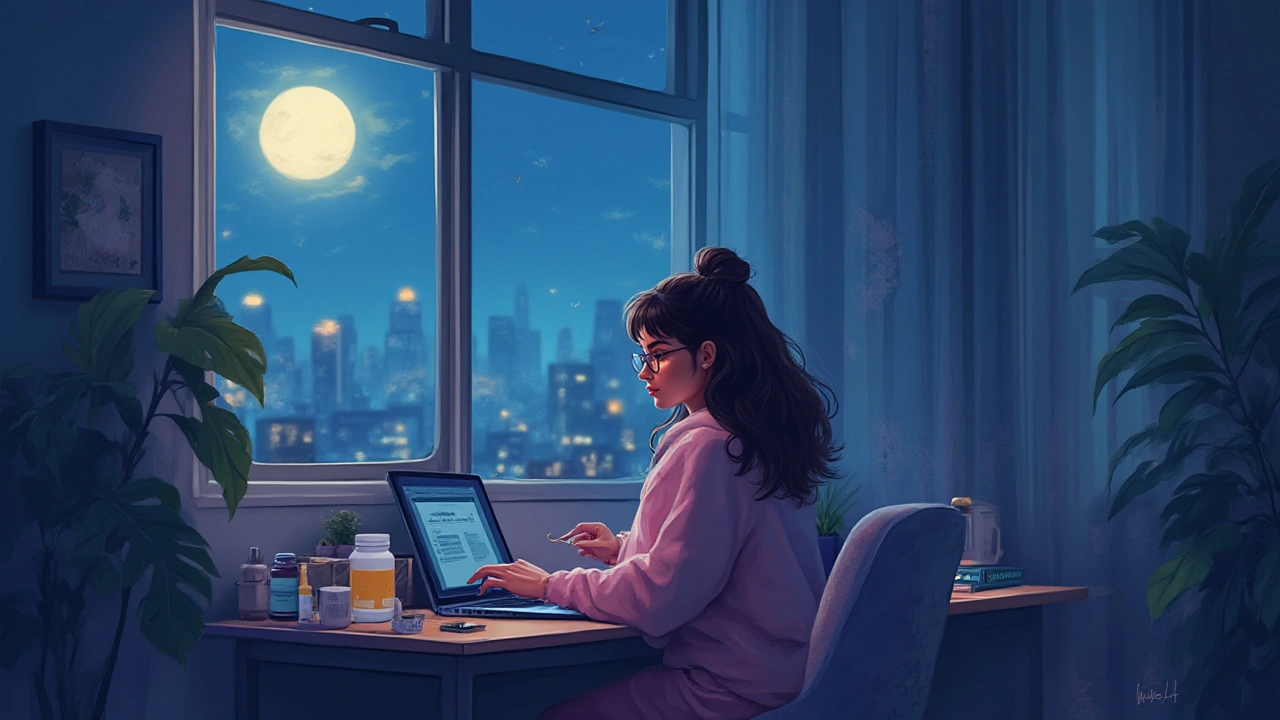If chugging coffee at 2 a.m. feels normal, you’re not alone. Around 20% of the global working population now runs on “social jet lag”: night shifts, rotating schedules, and late nights spent under flickering blue screens. While the rest of the world sleeps, night owls and shift workers keep lights on at hospitals, airports, and warehouses—making sure things don’t grind to a halt. But being awake when your body wants to snooze isn’t just a test of willpower. It messes with hormones, mood, digestion, and, quite frankly, your sanity. Here’s where smart pharmaceutical advice kicks in—not just to survive, but to stay sharp, alert, and as healthy as possible when living out of sync with the sun.
Why Night Owls and Shift Workers Feel So Off Balance
Let’s bust a myth up front: you can’t just “power through” night shifts forever without consequences. The body’s circadian rhythm—think of it as your internal clock—controls everything from alertness and hunger to how well your immune system works. Normally, melatonin rises in the evening to tell you it’s time for sleep, while cortisol bumps you up for the day. Shift work drags this rhythm out of sync. Researchers from Harvard found that shift workers could have up to 40% more risk of heart disease and a much higher likelihood of depression and diabetes. That groggy, underwater feeling after a night shift isn’t just tiredness—your brain’s still wired for sleep.
If you’re genetically a night owl, you’re no stranger to feeling out of step with early risers. But when you add rotating shifts or overnight work, it isn’t just about missing a bit of sleep. Your gut can revolt, your mental sharpness takes a hit, and even your medication timing can get weird. Every cell in your body literally “expects” you to be awake during the day and snoozing at night. Our intestines work faster during daylight; our livers process drugs differently depending on the hour; even our eyes are more sensitive to light at midnight than at noon. This impacts how your body handles medications, supplements, and stimulants.
To give you a clearer view, here’s a breakdown of how shift work messes with your biology:
| Body Function | Normal Timing | Disrupted By Shift Work |
|---|---|---|
| Melatonin Production | Rises at night | Suppressed by overnight lights |
| Cortisol (stress hormone) | Peaks in early morning | Peaks can shift, increasing anxiety |
| Digestive Speed | Quickest during daytime | Slower at night, causing GI issues |
| Alertness and Reaction Time | Best in afternoon | Sluggish during overnight shifts |
No wonder night workers hear phrases like “Are you okay? You look pale.” more often than they’d like. It’s not your imagination. The challenge is real and calls for some savvy tinkering—not just with your schedule, but also with how and when you use pharmaceuticals or supplements.
Managing Sleep: Pills, Supplements, and Smarter Timing
Chasing true rest while working nights is like chasing a dream—literally. Lots of folks reach for sleep aids or melatonin, and yeah, they can help, but not always the way you’d expect. Prescription sleeping pills like zolpidem (Ambien) or eszopiclone (Lunesta) are sometimes prescribed for sleep-onset insomnia, but the evidence says they’re mainly for short-term fixes. The risk? You can get hooked or build a tolerance, and they don’t fix the root problem: a scrambled body clock. The American Academy of Sleep Medicine warns not to use these drugs long-term unless your doctor insists.
Where does melatonin fit in? This little hormone “resets” your sleep clock. If you need to sleep at 9 a.m. after a shift, 1–3 mg of melatonin half an hour before bedtime can help press the reset button. Stanford researchers found that night shift nurses given melatonin fell asleep about 20 minutes faster—and their sleep felt deeper. It’s not a miracle cure though. The sweet spot? Use the lowest dose possible, and time it to your new “bedtime,” not midnight. The trick is not to take melatonin after daylight exposure, and especially avoid bright screens in your sleeping space.
Not all over-the-counter “sleep” products are safe or effective. Doxylamine and diphenhydramine (antihistamines sold as sleep aids) might help you crash, but you’ll wake up feeling like a zombie, and regular use brings memory problems. Natural supplements like valerian or magnesium may help settle frazzled nerves, but don’t expect a dramatic effect. If it feels like nothing works, a simple hack is to combine melatonin with a “wind-down” ritual: blackout curtains, white noise, and cool temperatures make a bigger difference than you’d think. In fact, blocking all outside light is second only to pharmaceuticals for pulling off daytime sleep in several studies.
Let’s not forget timing. Even something as plain as ibuprofen or paracetamol (acetaminophen) can act differently if taken in the middle of the night rather than in the afternoon. Your liver’s capacity to break down drugs fluctuates, so always follow medical advice and don’t double up on doses just because you “feel off schedule.”
Like Dr. Charles Czeisler, a sleep medicine expert at Harvard, put it:
“You can’t replace a lost night of sleep with a handful of pills. Real recovery rests on sleep hygiene and giving your body the right cues, not just medications.”

Staying Sharp: Using Caffeine, Prescription Stimulants, and Alternatives
Caffeine isn’t just a beverage for people who work nights—it’s a lifeline. But there’s such a thing as too much of a good thing. The sweet spot, according to Australian sleep researchers, is about 200 mg (roughly two strong cups of coffee) taken just before the post-midnight slump, around 1–2 a.m. Any more, and you’ll start racking up anxiety, jitteriness, or a crash that’s impossible to bounce back from. Avoid caffeine at least 6–8 hours before you plan to sleep—it hangs around much longer than most people think.
There’s a huge market for “energy” pills, gums, and specialty drinks targeting shift workers, but the evidence just isn’t there that they’re better than old-fashioned filter coffee. Be wary of unknown stimulants like modafinil (Provigil) or armodafinil (Nuvigil) unless you have a true sleep disorder like narcolepsy. While these prescription drugs can keep you awake—US pilots get them for very long flights—they also come with a list of side effects: heart palpitations, mood swings, dependency, and expense. The key is not to swap sleep for pills unless you must, and always talk to a doctor whose specialty is sleep medicine.
Some savvy night owls mix up their alertness routine by pairing caffeine with small snacks that balance fats and protein. This helps avoid “sugar crashes.” In fact, Dutch employers found staff made fewer mistakes on 12-hour shifts when encouraged to eat regular, tiny meals (think boiled eggs and apple slices) rather than hit the vending machines for chips or soda. Hydration also matters—a 2% drop in body water can spike fatigue just as fast as lack of sleep, so keep water within reach.
What about alternative boosters like ginseng or B-vitamins? While there’s plenty of hype, hard scientific proof is shaky. Save your money for blackout blinds and noise-canceling headphones. But if you’re looking for smarter pharmaceutical options, remember: timing is everything. If you absolutely need to stay awake, short-acting caffeine works best early in your shift, not hours before you’re supposed to sleep.
Pharmaceutical Pitfalls and How to Stay Healthy Long-Term
All these pharmaceutical strategies only get you so far if you ignore the basics. Night shift work is now officially recognized as a probable carcinogen by the World Health Organization. Why? It messes with melatonin and other protective hormones that keep body functions steady. People who mask their fatigue with pills but never catch up on sleep end up more likely to pick up viruses, gain weight, and develop chronic diseases. Don’t kid yourself—a strong cup of coffee might mask poor alertness, but it can’t fix a fried immune system.
If you regularly use sleep meds or stimulants, keep your doctor in the loop. Your needs change over time—what works at age 25 might backfire at 45. Be brutally honest about alcohol too. Having a “nightcap” after work feels relaxing, but it shreds sleep quality and increases dehydration. Even a single glass of wine or beer can ruin the second half of your sleep, leaving you even groggier when you wake up.
If possible, try anchoring one part of your daily routine to daylight. This means getting even 20 minutes of morning sun after a night shift—it tells your body, “the cycle is complete.” If scheduling allows, keep meal and medication times consistent, even if they’re off by a few hours from the typical 9-to-5 world. The more stable your routine, the better your body metabolizes everything you throw at it, from painkillers to essential vitamins. If you have to take regular meds for things like blood pressure or diabetes, talk to your pharmacist—some drugs should always be taken at the same time every “day,” even if your “day” starts at midnight.
Finally, technology can help. Blue-light–blocking glasses make a real difference for workers exposed to bright screens overnight. And using sleep-tracking apps to log rest, alertness, and med use isn’t just for fitness junkies—it gives you hard data on what works and what doesn’t. On days off, don’t overcompensate by sleeping all day. Aim for regular nap windows if you’re transitioning back to daytime hours, and consider using melatonin strategically to smooth the shift. If you start to feel seriously down or notice your health dipping, don’t tough it out—see a real sleep specialist, not just your primary care doc.
Here’s the quick takeaway: the secret sauce is routine—plus smart, careful use of meds and supplements when you need them. Don’t let the world of the day shift guilt you into feeling broken if your hours are different; your health is fixable, but you have to play the long game. Shift work isn’t going anywhere, so leveraging every tool, pharmaceutical or not, is your best shot at staying in the game.






